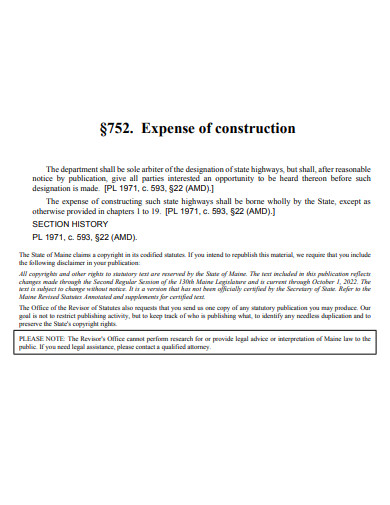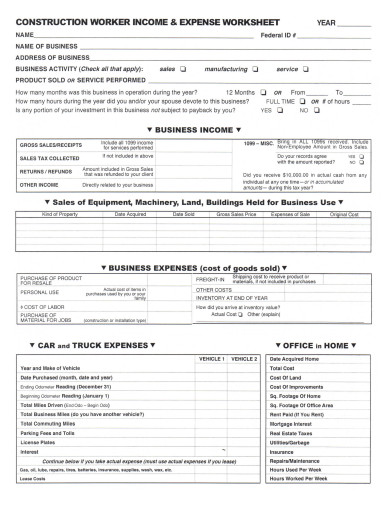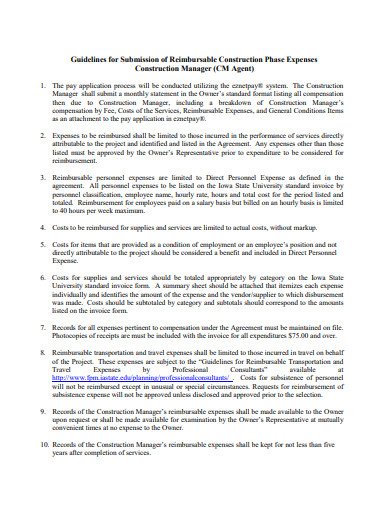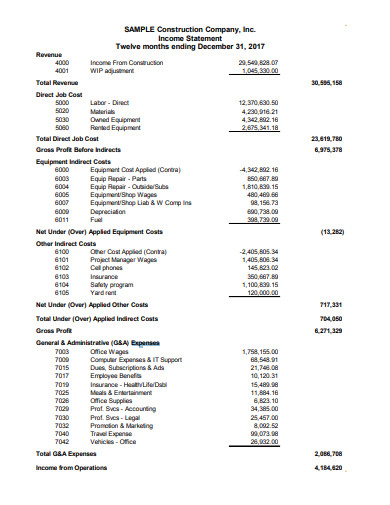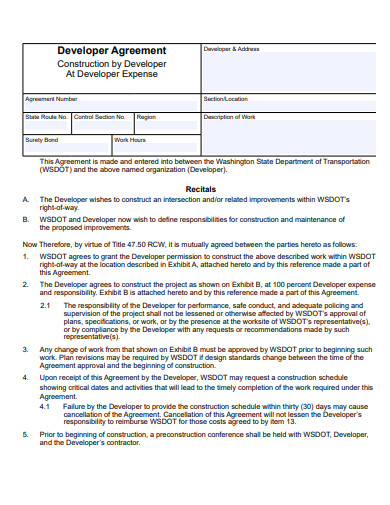In the vast realm of building and development, understanding sample construction expenses is pivotal. From raw materials to skilled labor, every component has its cost. Whether you’re a budding contractor or a homeowner with construction plans to renovate, delving into these sample costs provides invaluable insights. Navigate the intricate pathways of construction finance and make informed decisions, ensuring your project remains both high-quality and budget-friendly.
FREE 10+ Construction Expenses Samples
1. Construction Expense Report Template
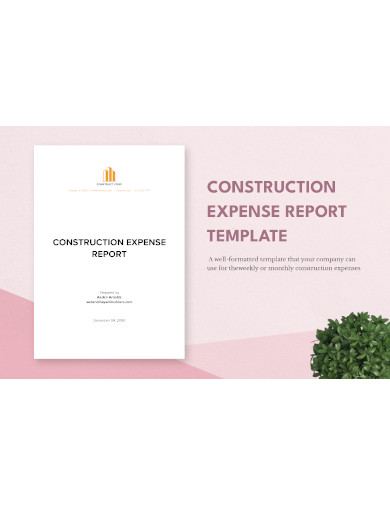
2. Commercial Construction Expense Tracking Template
3. Construction Expense Claim Form Template
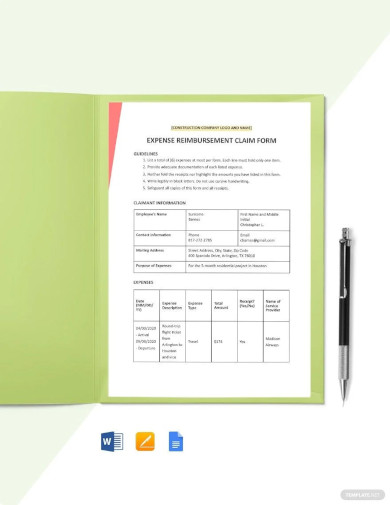
4. Construction Expense Tracking Template
5. Sample Construction Expense Template
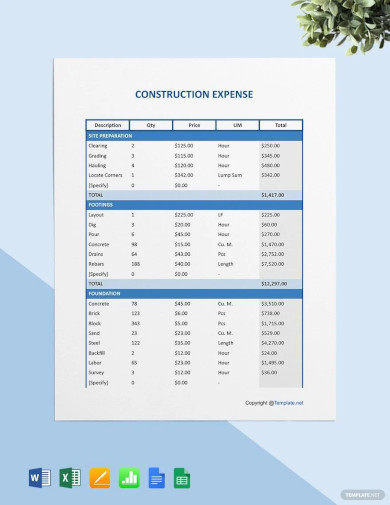
What are the Expenses of a Construction Project?
Every construction project is a labyrinth of financial commitments. While the end result is a tangible structure, the journey involves multiple expenditures, each as crucial as the next. Understanding these costs is essential for accurate budgeting, informed decision-making, and ensuring project viability.
Land Acquisition and Preparatory Costs
The first step in any construction journey is securing the land.
Acquisition Price: The principal cost of procuring the desired piece of land.
Legal Dues: Fees related to title transfers, property due diligence, and potential dispute settlements.
Groundwork Expenditures: Costs associated with making the land construction-ready, such as excavation, grading, and other preparatory activities.
Design and Consultation Charges
The blueprint of the project doesn’t just require paper and ink but expertise.
Architectural Compensation: Fees paid to architects for crafting the visual and functional essence of the project.
Engineer Consultation Fees: Bringing in structural, mechanical, and electrical engineers ensures the building is not just beautiful, but also safe and functional.
Labor and Skill-Related Costs
It’s the workforce that turns blueprints into reality.
Skilled Labor Charges: Remuneration for specialized professionals, including carpenters, masons, electricians, and plumbers.
Unskilled Labor Costs: The financial commitment for general helpers, who might not have a specific trade but are essential to the project.
Additional Labor Fees: Overhead charges or extra fees when workers are required to put in overtime or work under specialized conditions.
Material and Equipment Expenditures
Every inch of the construction relies on materials and the tools to put them in place.
Core Material Costs: Spending on fundamental materials such as cement, bricks, steel, and lumber.
Specialized Material Charges: For specific, possibly bespoke parts of the project, like custom tiles or specialized windows.
Machinery and Tools: Either the rental price or purchase cost for necessary construction equipment.
Regulatory and Administrative Fees
Legal permissions and administrative costs can’t be sidestepped.
Permission and License Fees: Costs for obtaining construction permits, environmental clearances, and other necessary licenses.
Insurance Premiums: Safeguarding the project, workers, and machinery often requires various insurances, each carrying its premium.
How to Create Construction Expenses?
Constructing a building might be a tangible activity, but creating a financial blueprint for the same requires a mix of analytical thinking, market research, and forward planning.
Beginning with a Broad Overview
A helicopter view before diving into specifics is always advisable.
- Define the Project: Understand and outline the project’s scale, objectives, and unique requirements.
- Initial Site Analysis: A cursory assessment to understand the groundwork needs and potential challenges of the construction site.
Collaboration with Professionals
Specialists bring accuracy and a wealth of experience.
- Engage Quantity Surveyors: Their expertise provides a detailed and accurate estimation of various construction costs.
- Early Architect Interaction: To ensure the envisioned design complements the budget and not vice versa.
Comprehensive Budget Formulation
An itemized, detailed budget is a safeguard against unforeseen costs.
- List Materials with Precision: Detail every required material, from bulk purchases to the smallest nut and bolt.
- Estimate Labor Costs: Based on the duration, specialization, and estimated manpower.
Research, Quotes, and Market Analysis
Don’t commit without a comparative analysis.
- Diverse Vendor Quotes: Engage with multiple material suppliers to ensure optimal pricing and quality.
- Specialized Service Estimates: Gather diverse price points for niche services to guarantee value for investment.
Ongoing Documentation and Review
A dynamic approach ensures the project stays on the financial course.
- Track Every Penny: An updated log of expenditures aids in auditing and ensures transparency.
- Frequent Budget Reviews: Regularly compare actual expenses with projections to adjust and stay on track.
By approaching construction expenses with systematic planning and meticulous documentation, one can ensure efficient financial management throughout the project’s lifecycle.
6. Printable Construction Expense Template
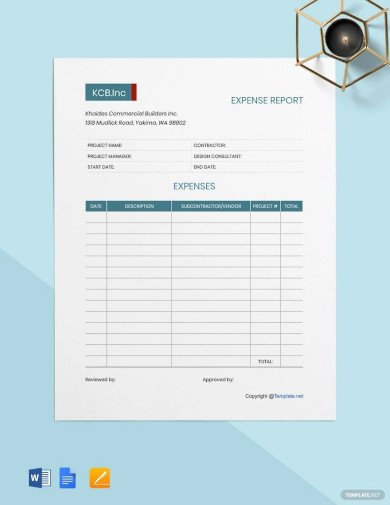
7. Construction Expense Template
8. Construction Worker Income and Expense Worksheet Template
9. Simple Construction Expense Template
10. Basic Construction Expense Template
11. Construction Developer Agreement Expense Template
What is a Construction Cost Worksheet?
In the world of building and construction, precision isn’t just required in the physical work but also in financial planning and management. Herein lies the significance of a construction cost worksheet.
Essence and Purpose
A construction cost worksheet is a comprehensive document or digital tool used to estimate, track, and manage expenses associated with a construction project. Think of it as the financial backbone of any construction task, ensuring that every penny spent aligns with the budgeted allocation.
Key Components
While each project has its nuances, and worksheets might differ, some universal elements persist.
Material Costs: Detailed listings of every construction material, right from the bulk items like cement or timber to small fixtures and fittings. Each item is often paired with quantities, unit prices, and total cost.
Labor Charges: A breakout of all the manpower-related costs, segmented by various trades such as masonry, plumbing, electrical, and general labor. This segment would factor in hourly wages or daily rates, overtime, and any other special allowances.
Equipment and Tooling: This portion highlights costs associated with machinery and tools, either rented or purchased, necessary for the project.
Overheads and Miscellaneous: Administrative costs, licenses, permits, insurances, and other unforeseen expenses find their place here. This section ensures that every aspect of the project, even those not directly tied to construction activities, is financially accounted for.
Utility in Budgeting
One of the main utilities of this worksheet is setting and adhering to construction budgets. By laying out anticipated costs in a structured manner, stakeholders can gauge the financial health of the project at any given point.
How to Keep Track of Construction Expenses
Ensuring that a construction project stays within budget is no small task. With myriad expenses, both anticipated and unforeseen, it’s imperative to have a system in place to track every financial outlay.
Embrace Technology
In today’s digital age, numerous software tools and applications cater specifically to construction financial management.
Dedicated Construction Software: Tools like QuickBooks for Construction or Procore offer platforms that simplify expense tracking, tying financials to project milestones.
Cloud-based Solutions: Cloud storage allows stakeholders to access financial data from anywhere, facilitating real-time updates and collaborations.
Maintain Regular Financial Audits
Setting periodic check-ins ensures no cost slips through the cracks.
Daily Logs: Encourage site managers or supervisors to maintain daily expense logs. This not only captures day-to-day costs but also aids in reconciling with the main budget.
Weekly or Monthly Reviews: Regular, more in-depth reviews offer a holistic picture, ensuring that the project is on the right financial track.
Work with Detailed Contracts
Having detailed contracts for every vendor, subcontractor, or service provider eliminates ambiguity.
Clear Payment Terms: Explicitly mentioning payment terms, milestones, and deliverables can significantly reduce financial disputes or oversights.
Change Order Management: Any deviations from the initial contract, in terms of tasks or costs, should be documented and approved through a structured change order process.
Implement a Systematic Filing System
A well-organized filing system, whether digital or physical, is invaluable.
Receipts and Invoices: Ensure every financial transaction, no matter how small, is supported by a receipt or construction invoice. Categorize and file them methodically for easy reference and audits.
Documentation of Refunds or Returns: It’s not just about tracking spending. If materials are returned or services are refunded, these transactions should be documented to reflect in the project’s financial status.
Engage Financial Experts
Consider bringing in financial experts or accountants who specialize in construction projects.
Expert Oversight: Their expertise can provide more in-depth insights, predict potential financial pitfalls, and ensure meticulous tracking of every expense.
By adopting a multifaceted, systematic approach to sample tracking expenses, construction projects can maintain financial transparency, preempt potential overspending, and ensure fiscal responsibility across the board.
Related Posts
Retirement Speech Samples & Templates
Weekly Schedule Samples & Templates
Contractual Agreement Samples & Templates
FREE 9+ Amazing Sample Church Bulletin Templates in PSD | PDF
Sample Business Card Templates
Sample Cashier Job Descriptions
Questionnaire Samples
FREE 10+ Sample HR Resource Templates in PDF
FREE 10+ HR Consulting Business Plan Samples in MS Word | Google Docs | Pages | PDF
FREE 49+ Sample Job Descriptions in PDF | MS Word
FREE 13+ Academic Calendar Templates in Google Docs | MS Word | Pages | PDF
FREE 10+ How to Create an Executive Summary Samples in Google Docs | MS Word | Pages | PDF
FREE 23+ Sample Event Calendar Templates in PDF | MS Word | Google Docs | Apple Pages
Company Profile Samples
FREE 10+ Leadership Report Samples [ Development, Training, Camp ]

